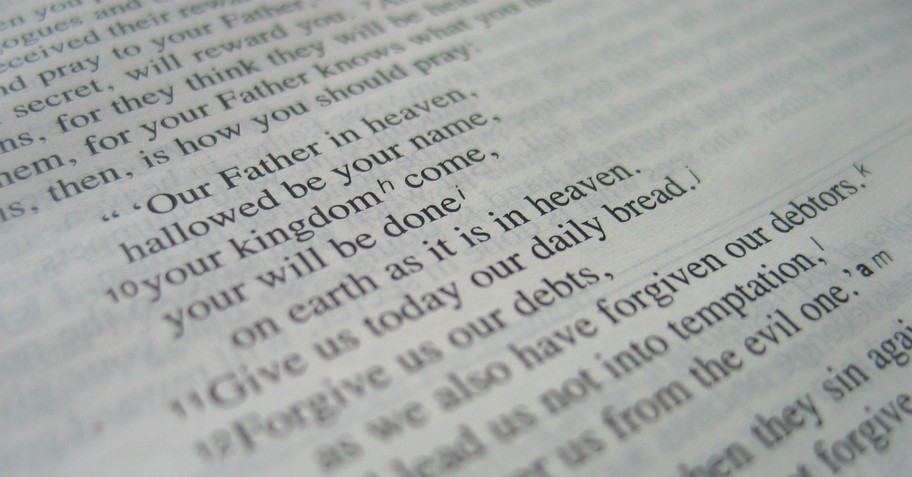What Does 'Thy Will Be Done' Mean during a Global Pandemic?

It’s dark in the garden of Gethsemane.
A distraught man stumbles forward, his sweat dripping from him like blood, and falls on his face to the ground. In his darkest hour, his friends have fallen asleep, leaving him alone to face the agony of what awaits. Though he’s tried to inform them of what’s coming, they haven’t quite understood.
There is only One to whom he can turn.
My Father,” he prays, “if it is possible, may this cup be taken from me.”
This man, soon to brutally die. Soon to be abandoned by all friends. Betrayed, whipped, mocked, executed. He knows all of this is coming, and more.
And yet he continues, “Yet not as I will, but as you will.”
Only hours from his arrest, Jesus himself begs God to release him from this burden. However, unlike so many of us would, he doesn’t end with this plea. Instead, he says, “Yet not my will, but yours be done” (Luke 22:42).
At some point (or even at multiple points), we all find ourselves in our darkest hour, where all we can do is pray fervently for deliverance, pray with all our hearts for what we believe is right.
We as humans love to try to control things, but in times like these, we find ourselves helpless. We find ourselves asking questions. Why is this allowed to happen? When will it stop? Has God abandoned us?
How do we, like Jesus, say, “Thy will be done?"
Photo Credit: ©GettyImages/C. Fish Images

Where Is 'Thy Will Be Done’ in the Bible?
God’s will is discussed many places in the Bible, far too many to address all of them here. However, the phrase “thy will be done” is most notably found in what has come to be called the Lord’s Prayer.
The Lord’s Prayer is found in Matthew 6:9-13 and Luke 11:1-4. In these passages, Jesus teaches how to pray. Matthew 6:10 specifically holds the phrase in question: “Your kingdom come, your will be done, on earth as it is in heaven.”
However, many of us better recognize the passage as translated in the King James Version: “Thy kingdom come, Thy will be done in earth, as it is in heaven.”
What Does ‘Thy Will Be Done’ Mean?
To pray “thy will be done” is to ask God to do what He desires.
That seems a bit strange at first. God is God. Of course, He will do what He desires. But there’s a bit more to it.
There are some things that God desires but will not force upon us. For example, it’s His will that we do not commit adultery, don’t steal, don’t murder, etc., as outlined in the Ten Commandments (Exodus 20), and that we love our neighbors as ourselves (Mark 12:31).
But we have the free will to do as we please, and often, we do the exact opposite.
When we say, “Thy will be done,” what we’re asking is that things come to align with His will—that righteousness would increase, justice be done, and the kingdom of God advance. Note that in the Lord’s Prayer, Jesus says, “Your will be done, on earth as it is in heaven” (Matthew 6:10). Just as the heavens are filled with joy and wholeness and the angels do exactly as God wills, we pray that the earth would be the same way.
Another aspect of saying “thy will be done” is offering a declaration of trust. There is nothing defeatist about saying “thy will be done.” Instead, it is an active choice to trust in God’s knowledge and goodness.
In the garden of Gethsemane, Jesus knew what he wanted. He wanted to be spared from the agony of the cross. However, he acknowledged that the Father knew best.
He asked that the Father’s will be done, whether that was to spare him or to send him to the cross.
Photo Credit: ©GettyImages/Matthew Maude

What Does it Mean for Us to Pray ‘Thy Will Be Done’ During COVID-19?
We are in a unique situation. Often, we face our own personal crises, or local disasters, or scary situations specific to our own country. However, COVID-19 has brought us together all over the world.
Many of us fear that we or those dear to us will fall ill. Others have faced the illness, or even lost loved ones. Medical professionals pull long hours, trying to keep up. Meanwhile, others worry about making ends meet while unable to work, or finding supplies during shortages.
We don’t know why God allowed COVID-19, though we might try to speculate. However, there are some things that we do know.
We know that God wants us to love one another and care for one another. We know that He wants peace, love, and integrity. So we pray, “Thy will be done.”
We know that God can use even the worst of situations for good (Romans 8:28). He can bring the deepest darkness to light, redeem any circumstance. So we pray that His will be done, that earth would reflect heaven.
We know that God knows best. So instead of worrying, despairing, or being angry at God, we can make the decision to trust. When we don’t know what will come next, we say, “Thy will be done.”
As was stated above, we are in a uniquely united situation. Together, believers all over the world can pray the same thing: “Thy will be done.”
All of us can raise up our voices together and ask that God would use COVID-19 to bring the kingdom of heaven to earth. We can pray that He would work for the good through each and every one of us.
Photo Credit: ©GettyImages/digitalskillet

The Goodness of God’s Will
It would be callous to say that COVID-19 is ‘a good thing.’ We may praise God for the good that He has worked in spite of the situation—bringing families together, helping us realize what truly matters, forcing us to slow down and focus on our relationship with Him. But that doesn’t mean we have to pretend this is good.
At the beginning, we spoke of Jesus’ plea in the garden of Gethsemane. Was Jesus’ suffering what witnesses would call ‘good?’ Was his violent and bloody death what anyone would wish? Of course not. Who would call the unfair slaying of the perfect Son of God a good thing? In a perfect world, this would not occur.
But we don’t live in a perfect world. In the broken world we live in, this brutal death was the only way we could be saved.
At the time, it must have seemed like the worst possible situation: the Savior of the world, dead. Instead, he rose in glorious triumph, and by his very suffering, we were made whole (Isaiah 53:5).
Imagine if Jesus had not submitted to God’s will. Imagine if he decided to pursue his own will.
All of us would be doomed.
Things don’t look good right now, in the throes of coronavirus worldwide. But we know who is good: God. Let us pray that His good and perfect will would be done in this situation.
May we one day look back and see the wonderful things He has done.
Photo Credit: ©GettyImages/Arthit Longwilai
Originally published April 13, 2020.









